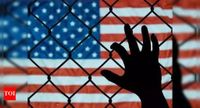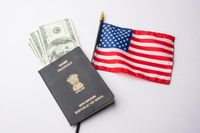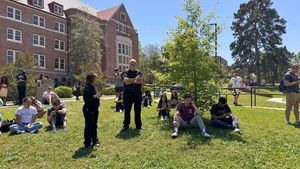In a troubling trend affecting international students in the United States, particularly those from India, numerous visa cancellations have been reported, leading to fears of deportation among those affected. The revocation of F-1 visas has intensified scrutiny of students' behaviors, both on campus and in their personal lives, with many facing consequences even for minor infractions.
As of April 9, 2025, several prestigious universities, including Harvard, Stanford, UCLA, and the University of Michigan, have reported a sharp increase in visa cancellations among international students, primarily targeting Indian nationals. Once an F-1 visa is revoked, students lose their legal immigration status and may be forced to leave the country. The situation has escalated to the point where even minor offenses, such as speeding tickets or shoplifting, can trigger a review of a student's visa status.
Many students have expressed frustration over the U.S. government's response to the ongoing conflict in Gaza, which has seen its 18th month. Some of the visa cancellations appear linked to students expressing support for Gaza-related causes on social media, even when they have no direct ties to protests or criminal activities. According to the Associated Press, a new artificial intelligence system, reportedly named "Catch and Revoke," has been implemented to flag students suspected of supporting Hamas or other designated terrorist organizations.
Secretary of State Marco Rubio confirmed that more than 300 international students have had their visas revoked, with many universities blindsided by the wave of cancellations. The Harvard International Office, for example, was unaware of the specific reasons behind the cancellations until alerted during routine checks. In an internal memo, the office acknowledged that peer institutions were experiencing similar issues.
Legal experts have raised concerns over the legality and fairness of this crackdown. Historically, minor infractions like speeding or first-time shoplifting rarely led to deportation or visa revocation. However, under the immigration policies established during the Trump administration, scrutiny has intensified. Immigration attorney Chand Paravathneni, who represents more than 30 students facing similar situations, noted that students are now being penalized for offenses that, in the past, would not have warranted such severe action.
Some students have reported receiving termination notices from their Designated School Officials (DSOs) stating that their Student and Exchange Visitor Information System (SEVIS) records have been terminated. This means their visa, Form I-20, and work authorization are no longer valid, regardless of whether they have resolved their legal issues. For instance, one student who received a speeding ticket two years ago is now facing deportation despite having paid the fine.
Moreover, the situation has been complicated by the scrutiny of students' social media activity. New visa applicants are reportedly being evaluated based on their online presence, with concerning information potentially leading to refusals. This trend has raised alarms among education consultants, who warn that the uncertainty surrounding F-1 student visas could undermine the academic and career aspirations of thousands of Indian students.
In a particularly alarming case, an Indian student whose identity was stolen and misused was acquitted in court but still faced visa revocation. Despite presenting video evidence and following legal procedures, his SEVIS record was terminated, placing him at risk of self-deportation. Paravathneni remarked, "These students have spent lakhs of rupees, taken educational loans, and now, they’re not even allowed to complete their degrees. This is really concerning."
Another student from Hyderabad, who was involved in a minor DUI incident, was told to leave the country despite having complied with all legal requirements. Similarly, a student who was arrested for shoplifting items worth $144 was later acquitted, yet his visa status was still jeopardized. These instances highlight a growing trend where even those found not guilty by courts are not spared from visa cancellations.
Legal experts are advising students to seek immediate assistance if they receive visa termination notices. Many are encouraged to contest the revocation through legal channels, as self-deportation should be a last resort. The American Civil Liberties Union (ACLU) is also taking action, filing lawsuits on behalf of students whose visas were revoked without adequate explanation or due process.
As the situation continues to evolve, the impact on the Indian student community is significant. With India being the second-largest contributor of international students in the U.S., the wave of visa cancellations could deter future students from pursuing their education in American universities. Education consultants emphasize the need for students to be aware of their rights and the legal options available to them.
The crackdown on international students, particularly those from India, raises pressing questions about the future of educational exchange and the treatment of foreign students in the U.S. As students navigate these uncertain waters, it is clear that the implications of these policy changes will resonate far beyond the classroom.









